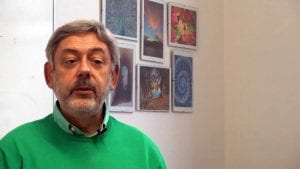Covid-19: plans, procedures and improvisation
By Saqar ' M Al Zaabi, on 15 April 2020
Written by Professor David Alexander
I have been speaking widely on the COVID-19 crisis on television, radio and podcasts, and in newspaper and magazine articles. As my main speciality is emergency planning and management, most of my comments have dealt with this field. I first came into contact with the scenario for a major 21st-century global pandemic in 2008. This was the collective result of an initiative launched in the mid-2000s by the World Health Organisation to provide a global response plan and encourage individual countries to prepare. Influenza was most feared, thanks to an on-going re-evaluation of the pandemic of 1918-1920 (which killed between 50 and 100 million people). However, the response to SARS in 2003 showed that concerted international action might be necessary to counter a lethal, infectious disease that was not a strain of influenza, and so it has proven.
In essence, emergency management is composed of three elements: plans, procedures and improvisation. The plans orchestrate the procedures, and both should reduce improvisation to a necessary minimum by foreseeing needs and designating means of fulfilling them. Failure to constrain improvisation in this way could be regarded as negligence.
In COVID-19 we see many examples of frantic improvisation as countries, including the United Kingdom, scramble to procure personal protective equipment, ventilators, respirators and so on, and as they hastily create and arrange the policing of social distancing measures. Adaptive management is practised, but not in the spirit in which it was invented (as a means of improving the efficiency of direction), but as a breathless attempt to keep up with a scenario that has not been read, interpreted and turned into preparations.
Although the broad scenario has been with us for between ten and 15 years, many of the details were either neglected or simply did not rise to prominence until the pandemic actually struck. These include the plight of people on large ships or in prisons, both places of confinement. Then there are, very significantly, the arrangements for supporting care homes for the elderly. In some places, more than half of the mortality from COVID-19 apparently occurs in such places, but they have not received the same level of support as have the hospitals and clinics, nor have they always been monitored or properly regulated. Thirdly, the role of social media and mass media in spreading misleading information, conspiracy theories and fantasies needs to be considered. Many people follow celebrities and a number of these have aided the spread of false information, which has led, for example, to multiple attacks on cellular masts under the fallacious assumption that 5G telephony causes the spread of the virus.
I have begun a COVID-19 observatory. This is simply a means of collecting information and classifying it. Because we live in a networked, highly interdependent world, modern disasters are cascading events in which chains and webs of causality occur. Pandemics are recurrent, and we need to refine the basic planning scenario for dealing with them at scales that extend from local to global. We also need to consider how to manage the later stages of the present crisis, and any resurgence of COVID-19 that may occur after the current wave. Information needs to be collected because much of it is ‘perishable’, which means that it is liable to disappear with time if not identified and recorded. It then needs to be classified so that the nature and connections of the cascade can be understood.
Emergency planning needs to be holistic and responsive. A plan should be a ‘living document’ which is constantly refined, updated and made known to its potential users. This gives the opportunity to broaden its scope and tackle previously neglected issues, such as the three outlined above. In emergency planning, experience is a great teacher, and it needs to be married with a systematic, logical approach to the rational use of available resources. These are all good justifications for studying cascades. Hence, at UCL-IRDR, we have a Cascading Disasters Research Group, which produces theory, applications and analyses of practical examples.
I will be pleased to hear from anyone who would like to contribute to the COVID-19 observatory. The results of the exercise will eventually be shared in order to help everyone gain a deeper understanding of what is going on.
Prof. David Alexander
 Close
Close


